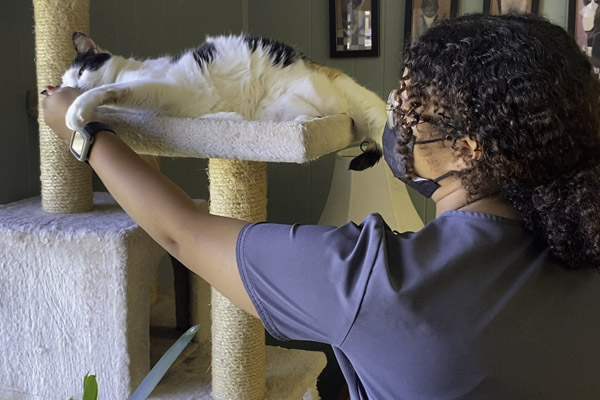Pre-Veterinary
Nazareth University's pre-veterinary program prepares students interested in applying to veterinary schools to earn a degree (DVM). Most veterinary schools require a strong undergraduate background in the sciences as well as extensive and diverse clinical experience. Pre-veterinary students must maintain a minimum GPA of 3.4 and perform at least 400 hours of community/pre-veterinary clinical service.
Competitive applicants typically have engaged in two or more areas of “Veterinary Experience” (small animal, large animal, research, food animal, production, exotic, aquatic, wildlife, zoological medicine, etc.) with substantial depth documented in at least one of these areas.
Related animal experiences are also viewed positively, such as working with livestock, breeding or showing various species, working at a zoo/aquarium/pet shop, or volunteering at an animal shelter. All animal experiences must be supported by a letter of evaluation, at least one of which should be from a veterinarian who can assess the student’s understanding of the profession.
Additional Information
Students wishing to apply to any of the 28 U.S. veterinary medical colleges (and/or the 4 Canadian veterinary medical colleges) must do so through the Association of American Veterinary Medical Colleges’ Veterinary Medical College Application Service. The specific requirements for each college can be found on the AAVMC website.
Students applying to the Cornell University College of Veterinary Medicine must take either the GRE General Test (preferred) or the MCAT examination. The typical average GPA is 3.7 or above. Please visit the Cornell University College of Veterinary Medicine website for more detailed information.
Study Abroad
Choose to enrich your experience through 70+ study abroad options, including Chile for pre-health.
Program Options

Veterinary internship
Student Kiara Roman had a summer internship learning to run a veterinary clinic, supported by a Nazareth SPARK Grant.
Example Careers/Outcomes
- Veterinarian
Undergraduate Research Topics
- Biochemical analysis of animal skin secretions
Graduate Schools/Employers
- Cornell University's College of Veterinary Medicine
Alumni Spotlight
Gabrielle Merry '20
Major: biomedical sciences
Quote: "I am so grateful for all the opportunities that Naz gave me and I can't wait to utilize them in my future studies and career."
What's next: Cornell University College of Veterinary Medicine